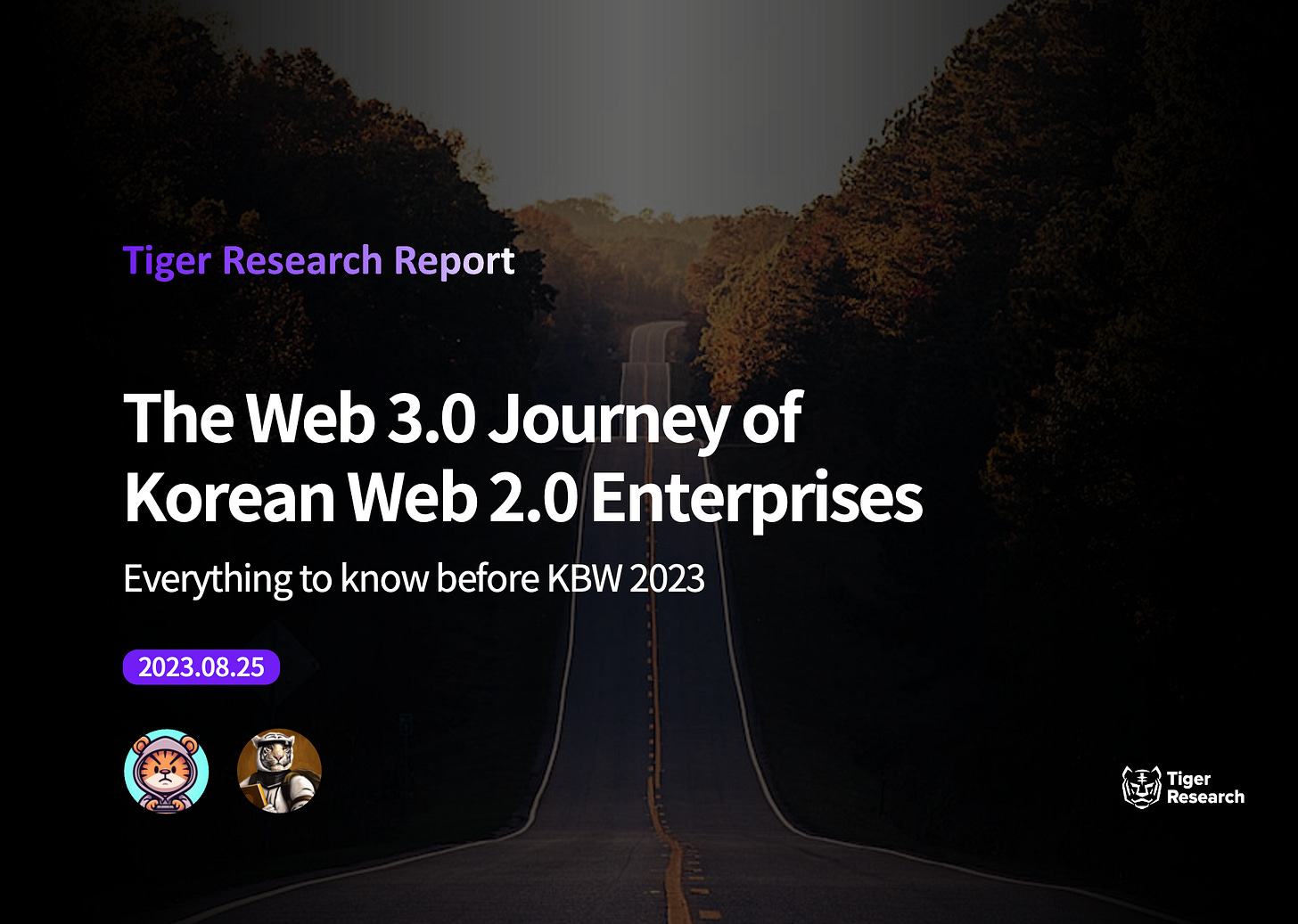
TL;DR
Over the last decade, artificial intelligence, cloud storage, and blockchain have emerged as disruptive technologies. While most agree that artificial intelligence and cloud technology are here to stay, blockchain technology still remains a controversial topic.
Up until now, Web2.0 companies have dabbled in the blockchain business depending on conditions of the cryptocurrency market. However, recently they have shown steady interest regardless of market volatility.
Over the next few years, Web2.0 companies' entry into blockchain is expected to be centered around gaming and STOs. Keeping an eye on developments in these two areas will become crucial.
Fortune favors the prepared
A mature company must constantly be on the lookout for new expansion opportunities if it wants to reach the next level of growth. Before a company can select a technology as a growth engine, investment in said technology must be preceded. Thus, there are several stages of review to ensure its utility and profitability. The more cases there are of large corporations implementing new technologies into real-life business models, the more likely it is that the technology has been thoroughly reviewed. This becomes an indicator of the actual utility of the technology.
Over the last decade, there have been three main areas of technology that have been considered as the next big growth drivers: 1) AI, 2) cloud technology, and 3) blockchain. While most people agree on the practical utility of A.I. and cloud technology, the same cannot be said for blockchain. This is because blockchain technology is closely intertwined with the cryptocurrency market. This results in the overall valuation of blockchain technology following the volatile market conditions regardless of its intrinsic value, which makes it difficult to develop it into a business.
For this reason, it is very difficult to judge whether blockchain technology has gained practical utility. Nevertheless, traditional Web2.0 companies have made many attempts to utilize blockchain technology, while the specific area of focus may have changed over the years. Although Web3.0 companies are the pioneers of blockchain technology, paying attention to the specific sector that Web2.0 companies are focusing on can also be a great indicator of its future applications.
The blockchain journey of Web2.0 companies from 2016 to 2022
The table above shows specific keywords related to blockchain technology that Web2.0 companies have shown an interest in. Most businesses shut down during the 2018 cryptocurrency bear market. When NFTs and DeFi ushered in the next bull market, more companies than before jumped on the blockchain bandwagon.
The movement of Web2.0 companies can be divided into three main stages: 1) business feasibility review, 2) empirical testing, and 3) commercialization. From 2016, many companies have gone through the research and empirical testing phase, now the focus is on commercialization of various business models. Granted, most are still in their early stages, so it is important to note that we have yet to see significant results.
Phase I : Business feasibility review (2016 to mid 2018)
From 2016 to mid-2018, blockchain technology gained global attention alongside the booming cryptocurrency market. During this period, many companies worldwide were examining the business potential of blockchain and actively conducting initial research and investment into the technology. The same was true for Korea, especially in the financial sector.
Samsung SDS
Active investment and research into UK cybersecurity firm Darktrace and Korean blockchain service provider Blocko.
Successful launch of BaaS (Blockchain-as-a-Service) platform Nexledger in 2017.
SK C&C
Development of 'Blockchain Logistics Service' for domestic and international shipping companies.
The service shares logistics information in a person-to-person network and provides effective logistics information management in combination with SK Telecom's Long-Range Wide-Area (LoRa) network.
Korea Electric Power Corporation
KEPCO and the Korea Electric Power Research Institute launched the 'Blockchain Service Platform Infrastructure' project.
Research and development focused on ledger sharing, a security-enhancing technology in blockchain.
Bank of Korea
Research on digital currencies using blockchain technology.
Basic research on the issuance and management of blockchain-based digital currencies.
Korea Securities Depository
Proof of Concept test to verify the feasibility of blockchain in the domestic capital market.
Focus on distributed ledger technology to ensure transaction transparency through a centralized structure.
KB Financial Group
Partnerships that utilized the infrastructure of fintech companies in areas such as overseas remittance services, personal certificates, and document security services based on blockchain technology.
Investment of KRW 1.5 billion (approx. $1.1M) in Bitcoin exchange Coinplug.
Phase II : Empirical testing (Mid 2018 to mid 2020)
With the onset of the recession in 2018, a lot of the research and investments made since 2016 were limited to passive tests. Many companies were forced to pump the brakes due to the negative image of the overheated cryptocurrency market. Nevertheless, companies that saw potential in the tests were willing to continue developing their businesses. Samsung SDI and LG CNS launched their BaaS businesses, Kakao Ground X launched the 'Klaytn' blockchain platform, and NAVER LINE launched 'Link Chain'.
Samsung SDS (Nexledger)
Expansion into various industries, including the application of blockchain technology to supply chain management.
Established a single point platform (SGP) to ensure a transparent, credible process financial transactions.
LG CNS
Launch of its own blockchain platform 'Monachain' in 2018
Provided services such as DIDs, digital vouchers, supply chain management.
Won a project to build an open blockchain platform for cloud-based electronic transactions and authentication for the Korea Mint Corporation.
Kakao
Launch of the Klaytn blockchain platform and various dApps after founding blockchain technology company Ground X.
Development of various blockchain business such as launching cryptocurrency wallet Klip.
Naver
Naver’s subsidiary company Line launched its own blockchain 'LINK Chain' and supported dApps based in Japan.
Expansion from private to public chain.
Hyundai Card
Implementation of blockchain to bring transparency to customer rewards and loyalty systems.
Launch of a blockchain-based "Single Sign-On (SSO)" service
Phase III : Commercialization (Mid 2020 to current)
Since mid-2020, the cryptocurrency market has been energized by the rise of NFTs and DeFi. NFTs, in particular, have gained prominence because they are a cost-effective method to achieve the kind of "autonomous communities" that Web2.0 companies are looking to build around their brands. At the same time, discussions about building a token-based reward system to reward community members, or "tokenomics," also gained momentum. However, as the popularity of NFTs waned, the market fell back into recession. Nevertheless, NFT projects led by major companies continued with their services.
Other than NFTs, gaming and STOs show sustained growth. Many game companies, with notable examples such as Nexon, Neowiz, and WeMade have entered the blockchain market. STOs, which have been steadily discussed since 2021, are now emerging as a major topic in the cryptocurrency market, and many financial institutions are paying attention to its rise.
On the other hand, the BaaS platforms of Samsung SDS and LG CNS have not been able to continue their growth and have experienced a period of stagnation. As of now, there seems to be no major trends in the BaaS business. Lambda256, a subsidiary of Dunamu, seems to be the only one continuing operations.
Lotte
Issuance Klaytn-based Belly Bear NFTs and benefits linked to Lotte Group.
Support of a new reward system using ‘Jelly’ after migration to Polygon.
Naver (Subsidiary: IPX)
Launch of various NFT projects such as Wade NFT.
Launch of Frenz platform that offers services such as character creation, NFT issuance, and IP ownership.
Nexon
Announcement of entry into the blockchain game market based on 'MapleStory' IP.
Announcement of plans to build the MapleStory Universe franchise around MapleStory N, a game with NFT integration.
WeMade
Launch of blockchain gaming platform 'Wemix Play', including the issuance of its native coin Wemix.
Release of P2E game 'Mir 4'.
Mirae Asset Securities
Formation a token securities consortium with SK Telecom and Hana Financial Group.
Development of Token Securities (ST) Integration Platform, expected to launch in early 2024.
Samsung
Integration of NFT wallet feature and ‘Samsung Blockchain Keystore’ on select Samsung smartphones and smartTVs.
Investment of $1B in 13 blockchain companies.
Conclusion
In the past, the entry of Web2.0 companies into the blockchain market was highly conditional on the performance of the cryptocurrency market. Many companies entered the blockchain market during the bull market, but it was also common to see many companies withdraw when conditions worsened.
However, times are changing. With a growing consensus on the potential of blockchain technology and its practical utility, many Web2.0 companies are continuing to develop blockchain-related businesses, regardless of market conditions.
In particular, Samsung Group has had extensive experience with blockchain experimentation, and is now partially participating in the market through investment. In addition, supply chain management is consistently mentioned as a keyword, as it is one of the areas regarded as having the highest potential for blockchain utilization.
Currently, Korean Web2.0 companies are focusing on two main areas: 1) gaming and 2) STOs (security token offerings). As the infrastructure and security technologies to support these areas are rapidly developing, it is expected that future Web2.0 companies' entry into the blockchain market will be centered on these two keywords.
For the next few years, the entry of Web2.0 companies into the blockchain market will be centered on two keywords: "gaming" and "STO". It is important to keep an eye on the movements and changes in these two areas, and watch the development of blockchain technology and the business opportunities it will bring.
Participate in our 1-minute survey to help improve our weekly reports. As a thank you, you can download Tiger Research's original "2023 Country Crypto Matrix" spreadsheet, an all-in-one spreadsheet for the global virtual asset market analysis after finishing the survey.







